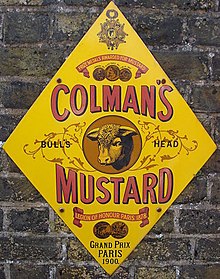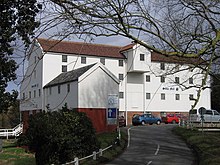 An old Colman's advert at the Buckinghamshire Railway Centre | |
| Product type | Mustard |
|---|---|
| Owner | Unilever |
| Country | Norfolk, East Anglia, England |
| Introduced | 1814 |
| Previous owners | Reckitt & Colman (now Reckitt Benckiser) |
Colman's is an English manufacturer of mustard and other sauces, formerly based and produced for 160 years at Carrow, in Norwich, Norfolk. Owned by Unilever since 1995, Colman's is one of the oldest existing food brands, famous for a limited range of products, almost all being varieties of mustard.
History[edit]
In the early 1800s, Jeremiah Colman began making mustard at a water mill near Norwich in the village of Bawburgh. To create a tangy flavour, he blended brown mustard (Brassica juncea) with white mustard (Sinapis alba).

Colman founded Colman's of Norwich in 1814, at the Stoke Holy Cross mill on the River Tas, four miles (6.4 km) south of Norwich.[1] In 1823 he took his adopted nephew, James, into the business, which became J. & J. Colman.[1]
In 1851, J. J. Colman took over the business.[1] By 1865, production had transferred to a large factory at Carrow Road on land at Thorpe Hamlet, bought from the Norfolk Railway to the south of Norwich,[1] where the firm operated until the Norwich closure.
From 1855, the firm introduced its distinctive yellow packaging and bull's-head logo. In 1866, it was granted the Royal Warrant as manufacturers of mustard to Queen Victoria.[1] His Majesty's household still uses Colman's today.[citation needed]
The Colman family's pioneering achievements in social welfare are part of Norwich's history. In 1857 a school was opened for the employees' children,[1] while in 1864, the firm employed a nurse to help sick members of staff, a social revolution at the time.[1]
From 1896, Jeremiah Colman became chairman.[2] In 1903, the firm took over rival mustard maker Keen Robinson & Company,[1] through which it also acquired the Robinsons barley water and baby food business.[3] The purpose of the acquisition was to reduce competition within the mustard business.[3]
In the 19th and early 20th centuries Wisbech uniquely held annual mustard markets where the sale of the harvest of 'brown' and 'white' seed took place. Regular annual Buyers included Messrs Colman's. [4][5]
By 1909, the company employed 2,300 people.[3]
Keen's production was moved from London to Norwich in 1925.[3]
Together with Reckitt, the company acquired French's, the American mustard manufacturer, in 1926 for £750,000.[3]
In 1938, it merged with Reckitts and Sons of Hull to form the Reckitt & Colman household products conglomerate.[1]
From 1997 to 2001, Colman's were the main sponsors of Norwich City Football Club.
The Colman's part of the business was demerged in 1995 and Colman's became part of Unilever UK Ltd.[1][6] In addition to mustard, it applies its name to condiments, sauces and other foodstuffs. Reckitt and Colman engaged in cost-cutting as it prepared to sell the brand, getting rid of the agronomy department, which had looked after plant breeding and seed development.[7]
Colman's maintains links with Norwich. The founding family are commemorated in street names such as Colman Road (part of the A140 inner ring road), on which is situated Colman First and Middle Schools. In addition, the Colman House residence at the University of East Anglia is named after the company and Jeremiah Colman.
Relocation[edit]
In January 2018, it was announced that Colman's was to leave its base in Norwich where the condiment had been produced for 160 years and would move its production to Burton-on-Trent and Germany.[8]
In 2019, the Colman's factory in Norwich rolled its last jar of mustard off the production line and its "best before" date was changed for the occasion to: "Norwich's Last. By Its Finest. July 24th 2019".[9] Colman's continued making other condiments at the Carrow site until closing its doors in early 2020.
Colman's Mustard Shop & Museum[edit]


The Mustard Shop traded in Norwich from 1973 to April 2017.[10] The shop was originally opened in Bridewell Alley.[10] In 1999, the shop was relocated to Norwich's Royal Arcade.[10] Norwich Heritage Economic & Regeneration Trust took over the shop in 2009, making it both a retail operation and tourism attraction.[10] In 2015, Guildhall Enterprises took the premises from HEART.[11] The shop was closed in April 2017.[10][11]
Publicity[edit]
In the 1920s, Dorothy L. Sayers worked on their account. Sayers was employed by S. H. Benson; her collaboration with artist John Gilroy resulted in "The Mustard Club" for Colman's Mustard.[12] Media slogans such as "Come on Colman's, light my fire" appeared in the late 20th century.
While the product was still manufactured in Norfolk, Colman's was the main shirt sponsor of Norwich City Football Club.
Product range[edit]
- Colman's English Mustard
- Colman's Condiments
- Bramley Apple Sauce
- Mint Sauce
- Cranberry Sauce
- Horseradish Sauce
- Seafood Sauce
- Tartare Sauce
- Colman's recipe mixes
- Beef bourguignon
- Sausage & onion casserole
- Coq au vin
- Chicken pie
- Fish pie
- Beef casserole
- Chilli con carne
- Sausage casserole
- Chicken casserole
- Cottage pie
- Spaghetti bolognese
- Tuna pasta bake
- Chicken chasseur
- Shepherd's pie
- Hot chilli con carne
- Chicken supreme
- Beef stroganoff
- Lamb hotpot
- Colman's sauce mixes
- Pepper sauce
- Onion sauce
- Parsley sauce
- Cheddar cheese sauce
- White sauce
- Bread sauce
- Colman's Big Night In
- Salt and pepper chicken
- Mexican burritos
- Korean barbecue
- Argentinian steak
- Chicken kebab
- Ultimate burger
- Doner kebab
- Colman's Season & Shake
- Mediterranean chicken
- Garlic & herb roast chicken
- Piri piri chicken
- Sweet chilli chicken
- Cajun chicken
See also[edit]
References[edit]
- ^ a b c d e f g h i j "Colman's History". colmansmustardshop.com. 8 June 2009. Archived from the original on 8 June 2009. Retrieved 8 December 2018.
- ^ "Department of Biochemistry: History". University of Cambridge. 2015. Archived from the original on 3 August 2009. Retrieved 8 December 2018.
- ^ a b c d e "The Emergence of Modern Marketing" (PDF). Archived from the original (PDF) on 9 August 2014. Retrieved 21 March 2015.
- ^ "Coleman of Norwich". Stamford Mercury. Retrieved 21 September 2019. – via britishnewspaperarchive.co.uk (subscription required)
- ^ "Coleman of Norwich". Wisbech Standard. Retrieved 4 October 2019.
- ^ "Colman's Norwich factory jobs may be at risk". BBC News. 25 June 2013. Retrieved 8 December 2018.
- ^ Warwicker, Michelle; Saladino, Dan (2 September 2012). "How English mustard almost lost its name". BBC Food. Archived from the original on 2 September 2012. Retrieved 21 March 2015.
- ^ "Colman's to leave Norwich base after 160 years". BBC News. 4 January 2018. Retrieved 4 January 2018.
- ^ "Last Colman's Mustard jar rolls off Norwich production line". BBC News. 25 July 2019.
- ^ a b c d e Knights, Emma (18 April 2017). "Colman's Mustard Shop to close and reopen in a new Norwich site later in the year". Eastern Daily Press. Archived from the original on 9 December 2018. Retrieved 8 December 2018.
- ^ a b Powell, Luke (6 October 2017). "Colman's artefacts put into storage as plans to re-open Norwich's famous Colman's Mustard Shop scrapped". Eastern Daily Press. Archived from the original on 6 October 2017. Retrieved 8 December 2018.
- ^ Barbara Reynolds. Dorothy L. Sayers: Her Life and Soul. NY: St Martin's Griffin, 1997. P. 164-165